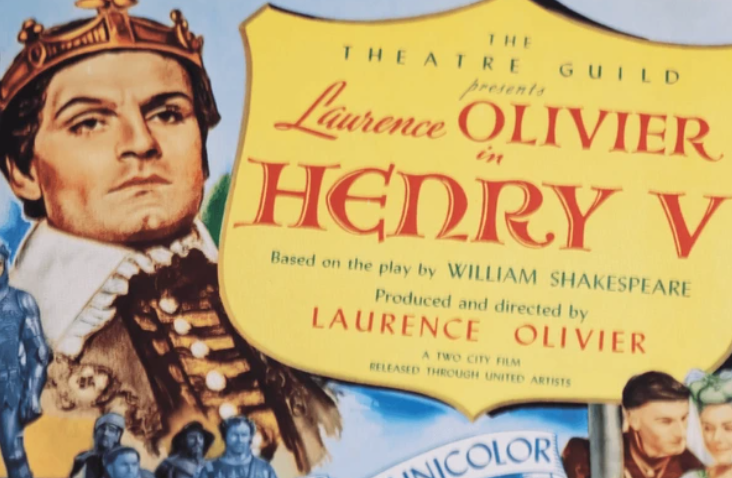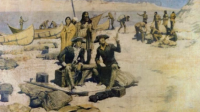Introduction: The Rise of the Hohenstaufen Dynasty
The year 1106 marks a pivotal moment in European history with the ascension of Henry V to the throne as the Holy Roman Emperor. His rise not only solidified his position as one of the most powerful rulers of his time but also initiated the Hohenstaufen dynasty, a lineage that would significantly shape the political and cultural landscape of medieval Europe. The Hohenstaufens, known for their ambitious rulers and strategic marriages, would go on to become one of the most influential dynasties in the history of the Holy Roman Empire.
Read Also : The German Territories and the Nine Years’ War (1690): A Period of Turmoil and Transformation
The Early Life of Henry V: A Prince Destined for Power
Henry V’s early life was shaped by his upbringing as the youngest son of Emperor Henry IV. Born into a world of political intrigue and conflict, Henry was groomed from a young age to assume leadership. His education was comprehensive, preparing him for the responsibilities of ruling a vast empire. The turbulent reign of his father had a profound impact on Henry, influencing his views on governance and the delicate balance of power between the church and the state.
Henry V’s Early Years and Education
Born in 1081, Henry V was the youngest son of Emperor Henry IV and Bertha of Savoy. From a young age, Henry was groomed for leadership, receiving a comprehensive education that included military training, statecraft, and the study of law. His upbringing was deeply influenced by the turbulent reign of his father, who faced numerous challenges from both the papacy and rebellious nobles.
Henry V’s education was not just about learning the skills of governance but also understanding the complex relationships between the church and the state. His father’s struggles with the Investiture Controversy—a conflict over who held the authority to appoint church officials—shaped Henry’s understanding of the delicate balance of power that he would need to navigate as emperor. This early exposure to the intricacies of imperial rule would serve Henry well in his later years.
The young prince’s early life was steeped in the political intrigue of his father’s court. Henry grew up observing the delicate dance of diplomacy, military strategy, and the management of the empire’s vast territories. These experiences provided him with a unique perspective on leadership, one that would define his reign and the future of the Hohenstaufen dynasty.
The Influence of His Father’s Reign
Henry V’s early years were marked by the complexities of his father’s reign, particularly the ongoing Investiture Controversy—a conflict between the papacy and the Holy Roman Empire over the appointment of church officials. This conflict left a lasting impression on young Henry, shaping his views on the balance of power between the secular and ecclesiastical authorities. His father’s struggles with the nobility and the church would later influence Henry V’s own approach to governance.
The tension between Emperor Henry IV and the papacy over the control of church appointments was not just a political struggle but a battle for the soul of the empire. Henry V witnessed firsthand the challenges his father faced in maintaining authority, not only over the empire’s secular rulers but also over the church. This struggle deeply influenced Henry’s perspective on the role of the emperor, shaping his approach to leadership and his interactions with the church.
Henry V understood that the power struggles of his father’s reign were not just about personalities or politics, but about the fundamental structure of the empire. He realized that to succeed, he would need to navigate these tensions carefully, balancing the demands of the nobility with the authority of the church, all while maintaining the integrity of the empire.
A Youth Steeped in Political Intrigue
As a young prince, Henry V was not only educated in the traditional disciplines of leadership but also exposed to the political intrigues that characterized his father’s reign. He witnessed firsthand the challenges of maintaining authority over a vast and often unruly empire, experiences that would later inform his own reign as emperor.
The court of Henry IV was a place of constant maneuvering, where alliances were forged and broken, and power was both gained and lost in the blink of an eye. Henry V, growing up in this environment, learned the importance of strategy, loyalty, and the art of negotiation. These lessons would prove invaluable as he later faced his own challenges in consolidating power and leading the empire.
Henry’s early exposure to the complex dynamics of imperial politics also gave him a deep understanding of the challenges of governance. He learned that ruling an empire was as much about managing relationships and maintaining alliances as it was about military might or economic strength. This nuanced understanding of leadership would define his reign and the legacy of the Hohenstaufen dynasty.
The Development of a Strategic Mindset
Henry V’s early exposure to the challenges of ruling a vast empire instilled in him a strategic mindset that would define his approach to leadership. He understood that to maintain power, he needed to be not only a strong military leader but also a shrewd diplomat. This dual focus on military and diplomatic strategy became a hallmark of his reign.
As Henry V grew older, his education expanded beyond the traditional subjects to include the study of military tactics and statecraft. He learned from the best military minds of the time, honing his skills in preparation for the challenges he would face as emperor. This education, combined with his innate strategic acumen, made Henry V a formidable leader, capable of both defending the empire and expanding its influence.
The development of this strategic mindset was crucial for Henry V as he navigated the complex political landscape of the Holy Roman Empire. He understood that to succeed, he needed to be both a warrior and a diplomat, balancing the demands of his military campaigns with the need to maintain alliances and manage the empire’s vast resources effectively.
The Struggle for Power: Henry V’s Rebellion Against His Father
Henry V’s path to the throne was far from smooth. His relationship with his father, Emperor Henry IV, became increasingly strained as the young prince sought to assert his own authority. This tension culminated in a rebellion that would not only challenge his father’s rule but also divide the empire. Henry V’s rebellion was driven by a combination of personal ambition and a desire to restore stability to the Holy Roman Empire, which had been weakened by years of internal strife.
The Rebellion of 1104: A Power Play
In 1104, Henry V rebelled against his father, Henry IV, joining forces with discontented German princes who opposed the elder emperor’s policies. This rebellion was a significant turning point, as it not only strained the father-son relationship but also divided the empire.
Henry V’s rebellion was not just an act of defiance against his father but a calculated move to position himself as a leader capable of restoring order to the empire. The young prince understood that his father’s continued struggles with the nobility and the church had weakened the imperial authority, and he saw an opportunity to assert his own power by aligning himself with those who were dissatisfied with Henry IV’s rule.
The rebellion of 1104 marked the beginning of a new phase in Henry V’s life, one where he would take on a more active role in the empire’s governance. By challenging his father’s authority, Henry V demonstrated his willingness to take bold actions to secure his position and shape the future of the empire.
The Division of the Empire
Henry V’s rebellion against his father led to a deep division within the Holy Roman Empire. The empire was split between those who supported Henry IV and those who backed Henry V, leading to a period of internal conflict and instability.
The division of the empire was not just a political split but a reflection of the underlying tensions that had been building for years. The nobility, frustrated with Henry IV’s policies, saw in Henry V a leader who could potentially bring about the changes they desired. This division weakened the empire, making it more vulnerable to external threats and internal dissent.
Henry V’s ability to navigate this division and ultimately secure his position as emperor was a testament to his political acumen and his understanding of the complexities of imperial rule. By carefully managing his alliances and asserting his authority, Henry V was able to overcome the challenges posed by the division of the empire and solidify his rule.
The Path to Power
After securing the throne, Henry V sought to legitimize his rule by reconciling with the papacy and the German princes. His early reign was characterized by efforts to consolidate power and rebuild the authority of the imperial crown, which had been undermined by his father’s contentious reign.
Henry V understood that to successfully consolidate power, he needed to gain the support of key figures within the empire, including the nobility and the church. He worked to repair the relationships that had been damaged by his rebellion, offering concessions and making strategic alliances to strengthen his position.
The path to power was not easy, but Henry V’s ability to navigate the complex political landscape of the empire allowed him to secure his position as emperor. His early efforts to consolidate power set the stage for a reign that would be marked by both internal stability and external expansion, laying the foundation for the future success of the Hohenstaufen dynasty.
The Challenges of Consolidation
The consolidation of power was not without its challenges. Henry V faced resistance from those who had remained loyal to his father, as well as from other factions within the empire who sought to limit his authority.
The challenges of consolidation were exacerbated by the ongoing Investiture Controversy, which continued to create tensions between the emperor and the church. Henry V had to carefully balance his efforts to consolidate power with the need to maintain a cooperative relationship with the papacy, a task that required both diplomatic skill and political savvy.
Despite these challenges, Henry V was able to successfully consolidate his power, establishing himself as a strong and effective leader. His ability to navigate the complexities of imperial politics and manage the various factions within the empire was a key factor in the success of his reign and the establishment of the Hohenstaufen dynasty as a dominant force in European politics.
The Impact of Reconciliation
Reconciliation with the papacy and the German princes was a crucial step in Henry V’s efforts to consolidate power. By mending these relationships, Henry V was able to strengthen his position as emperor and secure the stability of the empire.
The impact of reconciliation was felt not only within the empire but also in its relations with other European powers. By securing the support of the papacy, Henry V was able to position himself as a legitimate and recognized ruler, which in turn strengthened his authority both within and outside the empire.
Reconciliation also allowed Henry V to focus on other aspects of governance, such as military expansion and economic development. With the support of key figures within the empire, Henry V was able to pursue his ambitious agenda, laying the groundwork for the future success of the Hohenstaufen dynasty.
Coronation as Holy Roman Emperor
Henry V’s coronation as Holy Roman Emperor was a pivotal moment in his reign and the beginning of the Hohenstaufen dynasty’s dominance in Europe. This event not only solidified his position as emperor but also marked the formal recognition of his authority by the Church. However, the coronation also set the stage for future conflicts between the Hohenstaufen dynasty and the papacy, as the struggle for power between the secular and ecclesiastical authorities continued to unfold.
The 1111 Coronation: A Symbolic Triumph
In 1111, Henry V was crowned as the Holy Roman Emperor by Pope Paschal II. This coronation was a significant event, as it symbolized the formal recognition of Henry’s authority by the Church, despite the ongoing tensions between the papacy and the empire. The coronation also marked the beginning of Henry’s efforts to establish the Hohenstaufen dynasty as a dominant force in European politics.
The coronation ceremony was a grand affair, attended by nobles, clergy, and dignitaries from across Europe. It was a moment of triumph for Henry V, who had successfully navigated the challenges of ascending to the throne and securing his position as emperor. However, the coronation also foreshadowed the ongoing struggles between the Hohenstaufen dynasty and the papacy, which would continue to shape the political landscape of the Holy Roman Empire for decades to come.
The symbolic importance of the coronation cannot be overstated. It represented the culmination of Henry V’s efforts to legitimize his rule and consolidate his power, while also highlighting the ongoing tensions between the secular and ecclesiastical authorities. The coronation was a key moment in the history of the Holy Roman Empire, setting the stage for the future conflicts and alliances that would define Henry V’s reign.
The Struggle with the Papacy
The coronation of Henry V did not resolve the underlying tensions between the emperor and the papacy. While the event was a moment of triumph, it foreshadowed the ongoing struggles that would characterize Henry’s reign. The relationship between the Hohenstaufen dynasty and the papacy would remain fraught with conflict, as both sought to assert their authority over the other.
The struggle with the papacy was not just a matter of power politics but also a reflection of the broader conflict between secular and ecclesiastical authority in medieval Europe. Henry V, like his father before him, faced the challenge of balancing his role as emperor with the demands of the church. The Investiture Controversy, which had been a central issue during Henry IV’s reign, continued to be a source of tension during Henry V’s rule.
Despite the ongoing conflicts with the papacy, Henry V was able to maintain his position as emperor and continue to expand the influence of the Hohenstaufen dynasty. His ability to navigate the complex relationship with the church, while also pursuing his own political and military ambitions, was a key factor in the success of his reign.
The Impact on the Holy Roman Empire
Henry V’s coronation had significant implications for the Holy Roman Empire. It strengthened the position of the emperor, but it also highlighted the ongoing power struggle between the secular and ecclesiastical authorities. The coronation was a key moment in the history of the empire, setting the stage for future conflicts and shaping the political landscape of Europe.
The impact of the coronation was felt throughout the empire, as it solidified Henry V’s position as the legitimate ruler and established the Hohenstaufen dynasty as a dominant force in European politics. However, the coronation also underscored the challenges that Henry V would face in maintaining his authority over the empire and managing the complex relationship with the papacy.
The coronation also had broader implications for the balance of power in Europe. As the Holy Roman Emperor, Henry V was now one of the most powerful rulers in Europe, with the potential to shape the course of European history. The coronation marked the beginning of a new era in European politics, one that would be defined by the ongoing struggle for power between the Hohenstaufen dynasty and its rivals.
The Challenges of Imperial Rule
The coronation of Henry V marked the beginning of his reign as Holy Roman Emperor, but it also brought with it a host of challenges. As emperor, Henry V faced the daunting task of governing a vast and diverse empire, one that was often divided by regional loyalties and internal conflicts.
The challenges of imperial rule were compounded by the ongoing tensions with the papacy, as well as the need to manage the relationships with the empire’s powerful nobles. Henry V’s ability to navigate these challenges and maintain his authority as emperor was a key factor in the success of his reign and the legacy of the Hohenstaufen dynasty.
Despite the difficulties he faced, Henry V was able to establish himself as a strong and effective ruler, capable of managing the complex political landscape of the Holy Roman Empire. His reign set the stage for the future success of the Hohenstaufen dynasty, which would continue to play a central role in European politics for generations to come.
The Legacy of the Coronation
The coronation of Henry V as Holy Roman Emperor in 1111 was a defining moment in his reign and the history of the Hohenstaufen dynasty. The event not only solidified his position as emperor but also set the stage for the future conflicts and alliances that would shape his reign.
The legacy of the coronation is still felt today, as it marked the beginning of a new era in European history, one that would be defined by the ongoing struggle for power between the Hohenstaufen dynasty and its rivals. The coronation was a key moment in the history of the Holy Roman Empire, setting the stage for the future success of the Hohenstaufen dynasty and shaping the course of European history for centuries to come.
The Hohenstaufen Dynasty: Establishing a Legacy
With Henry V’s ascension to the throne, the Hohenstaufen dynasty began to establish its legacy in Europe. The dynasty’s rulers were known for their ambitious expansionist policies, their complex relationship with the papacy, and their efforts to consolidate imperial power. Henry V’s reign was just the beginning of a dynasty that would leave a lasting impact on the history of the Holy Roman Empire and Europe as a whole.
The Hohenstaufen Ambitions for Expansion
With Henry V’s ascension to the throne, the Hohenstaufen dynasty began to pursue an ambitious agenda of territorial expansion and consolidation of power. The dynasty’s rulers sought to extend their influence beyond the borders of the Holy Roman Empire, engaging in military campaigns and strategic marriages to secure alliances and increase their dominions.
The Hohenstaufens were known for their military prowess and their ability to expand the empire’s territories through both conquest and diplomacy. Henry V’s reign marked the beginning of this expansionist agenda, as he sought to strengthen the empire’s position in Europe and establish the Hohenstaufen dynasty as a dominant force in European politics.
The dynasty’s ambitions for expansion were not without challenges, as they faced opposition from rival noble families and the papacy. However, the Hohenstaufens were able to overcome these obstacles through a combination of military strength and strategic alliances, allowing them to expand their influence and establish a lasting legacy in European history.
The Investiture Controversy: A Continuing Struggle
The Investiture Controversy, which had begun during the reign of Henry IV, continued to be a central issue during Henry V’s reign. The conflict revolved around the question of who had the authority to appoint bishops and other church officials—the emperor or the pope. This controversy was emblematic of the broader struggle between secular and ecclesiastical power in medieval Europe.
Henry V initially sought to resolve the Investiture Controversy through negotiation and compromise. In 1111, he reached an agreement with Pope Paschal II, known as the Concordat of Worms, which attempted to balance the interests of the empire and the papacy. However, the agreement was short-lived, and the conflict soon resumed.
The Investiture Controversy had significant implications for the Hohenstaufen dynasty. It weakened the authority of the emperor over the church and led to ongoing tensions between the papacy and the empire. Despite these challenges, the Hohenstaufens continued to assert their claims to authority, both in secular and ecclesiastical matters.
The ongoing struggle with the papacy was a defining feature of Henry V’s reign and the legacy of the Hohenstaufen dynasty. The conflict between the emperor and the pope would continue to shape the political landscape of Europe for decades to come, influencing the course of European history and the development of the Holy Roman Empire.
The Hohenstaufen and Papal Relations: A Complex Dynamic
The relationship between the Hohenstaufen dynasty and the papacy was complex and often fraught with tension. While Henry V sought to maintain a cooperative relationship with the Church, the ongoing Investiture Controversy and other disputes made this difficult.
The papacy was wary of the growing power of the Hohenstaufen dynasty and sought to limit its influence. This led to a series of conflicts between the papacy and the Hohenstaufen emperors, who were determined to assert their authority over both secular and ecclesiastical matters.
Despite these conflicts, the Hohenstaufens were able to maintain their position as one of the most powerful dynasties in Europe. Their ability to navigate the complex relationship with the papacy, while also pursuing their own ambitions, was a testament to their political acumen and determination.
The complex dynamic between the Hohenstaufen dynasty and the papacy was not just a struggle for power but also a reflection of the broader conflict between secular and ecclesiastical authority in medieval Europe. The Hohenstaufens’ ability to manage this relationship, while also pursuing their own political and military goals, was a key factor in the success of their dynasty.
The Legacy of Henry V and the Hohenstaufen Dynasty
Henry V’s reign marked the beginning of a dynasty that would leave a lasting legacy in European history. The Hohenstaufen dynasty’s rulers were known for their ambitious expansionist policies, their complex relationship with the papacy, and their efforts to consolidate imperial power.
The dynasty’s legacy was not only shaped by their political and military achievements but also by their contributions to culture and the arts. The Hohenstaufens were patrons of architecture, literature, and learning, and their reign saw the flourishing of medieval culture in the Holy Roman Empire.
Henry V’s reign set the stage for the future success of the Hohenstaufen dynasty, which would continue to play a central role in European politics for generations. The dynasty’s influence would be felt long after Henry V’s death, as his successors continued to build on his legacy and expand the power and influence of the Holy Roman Empire.
The Hohenstaufen Dynasty’s Influence on European Politics
The Hohenstaufen dynasty’s influence extended far beyond the borders of the Holy Roman Empire. The dynasty’s rulers were involved in the major political and military events of their time, from the Crusades to the conflicts with the papacy. Their strategic marriages and alliances also helped to shape the political landscape of Europe, as they forged connections with other powerful dynasties and expanded their influence.
The Hohenstaufens were known for their ability to navigate the complex and often treacherous world of medieval European politics. Their success was not only due to their military prowess but also to their skill in diplomacy and their ability to forge alliances with key players in the political arena.
The legacy of the Hohenstaufen dynasty is still remembered today as one of the most powerful and influential dynasties in European history. Their impact on the political, cultural, and religious landscape of Europe was profound and lasting, and their legacy continues to be studied and admired by historians and scholars.
Conclusion: The Enduring Legacy of Henry V and the Hohenstaufen Dynasty
Henry V’s ascension to the throne in 1106 marked the beginning of the Hohenstaufen dynasty, a lineage that would have a profound impact on the history of the Holy Roman Empire and Europe as a whole. His reign was characterized by efforts to consolidate imperial power, navigate the complex relationship with the papacy, and expand the influence of the Hohenstaufen dynasty.
The legacy of Henry V and the Hohenstaufen dynasty is one of ambition, power, and influence. The dynasty’s rulers were able to navigate the challenges of their time and leave a lasting mark on the political, cultural, and religious landscape of Europe. Their contributions to medieval history continue to be studied and admired, and their legacy remains an important part of European history.
FAQ About Henry V and the Hohenstaufen Dynasty
Who was Henry V, and why is he significant?
Henry V was the Holy Roman Emperor from 1106 until his death in 1125. His reign marked the beginning of the Hohenstaufen dynasty, which would become one of the most influential dynasties in European history. Henry V is significant for his efforts to consolidate imperial power, navigate the complex relationship with the papacy, and expand the influence of the Holy Roman Empire.
What was the Investiture Controversy?
The Investiture Controversy was a conflict between the Holy Roman Empire and the papacy over who had the authority to appoint bishops and other church officials. This conflict was a central issue during the reigns of both Henry IV and Henry V and was emblematic of the broader struggle between secular and ecclesiastical power in medieval Europe.
How did Henry V’s coronation impact his reign?
Henry V’s coronation as Holy Roman Emperor in 1111 was a pivotal moment in his reign. The coronation solidified his position as emperor and marked the formal recognition of his authority by the Church. However, the coronation also set the stage for ongoing conflicts with the papacy, as both sought to assert their authority over the other.
What was the legacy of the Hohenstaufen dynasty?
The Hohenstaufen dynasty is remembered as one of the most powerful and influential dynasties in European history. The dynasty’s rulers were known for their ambitious expansionist policies, their complex relationship with the papacy, and their contributions to culture and the arts. The legacy of the Hohenstaufen dynasty continues to be studied and admired by historians and scholars.
How did the Hohenstaufen dynasty influence European politics?
The Hohenstaufen dynasty played a central role in the major political and military events of their time, from the Crusades to the conflicts with the papacy. Their strategic marriages and alliances helped to shape the political landscape of Europe, and their influence extended far beyond the borders of the Holy Roman Empire. The dynasty’s ability to navigate the complex world of medieval European politics was a key factor in their success and lasting legacy.







1 comment